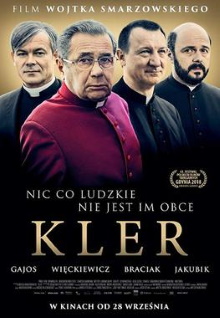
This Polish film made the news a while back as it had ruffled quite a few feathers in its country of origin. That’s no wonder as it directly attacks the Catholic Church in Poland on multiple fronts, accusing it of many, many types of wrongdoings. Most surprising to me is that it was a commercial success and broke box office records. That’s extraordinary for a serious drama like this and really speaks of how important this issue in is Poland.
Three men get shit-faced drunk together and we later see that all three are priests who know each other well. We also learn that they, and just about everyone else in the clergy, are flawed people. Trybus is an alcoholic who is living with a single woman. Kukuła is suspected of being a pedophile after a child collapses in his church and is found to have been sexually abused. Meanwhile Lisowski works directly for the archbishop and wants to be transferred to the Vatican. However the archbishop Mordowicz finds him to be too important as a go-between to solve various problems as he is intent on building Poland’s largest sanctuary. In between paying bribes to hide the discovery of corpses on the building site, arranging for gangsters to win church contracts and silencing journalists and other critics, he also secretly records all of the archbishop’s meetings in order to blackmail him.
As you can tell, this film pulls no punches and there is seemingly no evil that is out of bounds to the Catholic Church of Poland. The wrongdoing isn’t just limited to the main characters. The film depicts the entire institution as being corrupt from the top down. When a man comes to testify about how he was abused as a child, senior priests defend their own and question the man’s motives for attacking the church. When Kukuła tries to investigate the child’s case on his own, the nuns shut him down and says that he will be reported for his stubbornness. A retiring priest is worried about securing a nice apartment to stay in while even young priests are shown discussing ways to evade the rules. At no point is any member of the clergy, with the exception of Kukula, seen being actually interested in the well being of any worshipper. I’m no friend of the church but this is all frankly too much. It’s so imbalanced that it veers into the caricatural.
The film is further weakened by having three main characters who each have their own individual storylines and barely interact with one another after the opening scene. Each story could have made for a fine film on its own but packing them together actually diffuses their emotional impact. There is a rich vein of material here, how mandatory celibacy could be seen as inhuman for example, or how clergy who were abused as children go on to abuse other children, or the confluence of political power, EU funding, religious influence and criminal interests, but this film doesn’t give enough space these issues and themes to properly breathe. The density of the plot also forces the film to go at a pace that is a little too fast, making it easy for audiences, especially non-Polish ones, to lose track of the details.
Maybe the filmmakers felt that they only had one shot at this and so packed in everything that they could. If so, its success should be taken to mean that audiences are indeed receptive to what they have to say so they should go back and explore these characters and issues in deeper, more psychologically insightful ways. As it stands, this is a brave film and I suppose it might be eye opening for those who still have faith in religious institutions. But as much as I want to like it, I can’t call it a good film.